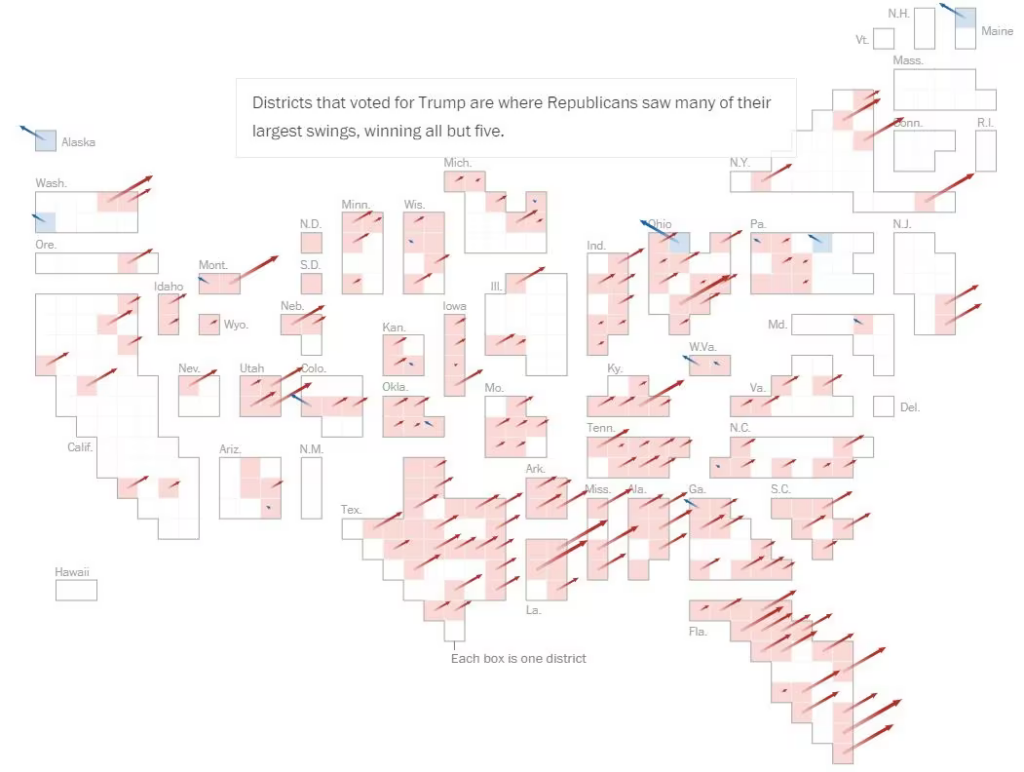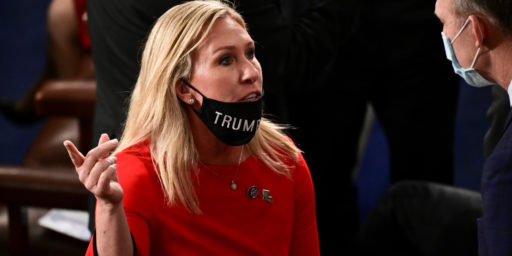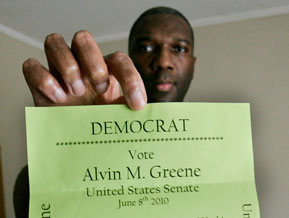The GOP’s MTG Reality
Setting the tone.

This piece from WaPo has been sitting in an open tab for a couple of weeks, but it is still worth noting: The GOP’s big risk in legitimizing Marjorie Taylor Greene. It dovetails quite well with a post I recently wrote, Primaries and Party Evolution, which discussed how Marjorie Taylor Greene went from newbie to fringe member of the House to in the middle of it all (as per the photo above). It also connects, more broadly, with another open tab I have from late January, also in the WaPo: GOP gives the Freedom Caucus the keys to the car.
Since I am making a number of reading recommendations, let me also suggest a piece from the January/February edition of The Atlantic: Why is Marjorie Taylor Greene Like This? The most disturbing part of the profile is that her origins are pretty darn mundane. (But, I digress).
In general, we are seeing the convergence of the following factors:
- The growth of the reactionary, populist right as a major wing of the Republican Party, as represented by people like MTG.
- The desperation of Kevin McCarthy to be Speaker.
- The lack of any other leadership alternative.
- A narrow seat margin in the chamber.
All of this sums to McCarthy being willing to do whatever he needed to win the position with the bulk of the GOP falling in line. They had no internal alternative and there was not going to be any crossing of party lines to find some kind of bipartisan coalition-the incentives against such behavior are enormous (in simple terms, the risk of massive primary-level backlash for participants of both parties in such a deal).
In basic terms, all of these factors mean people like MTG (and Matt Gaetz, Lauren Boebert, and the like) become vital votes in anything McCarthy wants to do (and hence the over-representation of the Freedom Caucus in key committee as noted in a link above).
The WaPo piece suggests that the GOP is running a risk in legitimizing MTG because she isn’t especially popular:
But just what does it mean for the GOP to promote Greene (R-Ga.) as a face of the party? And what do voters think of the newly legitimized, conspiracy theory-touting congresswoman?
Surveys make clear that Americans writ large don’t have much regard for Greene, at least right now. What’s perhaps less obvious is that even Republicans don’t seem to have too much affection for her.
The piece goes on to show, pretty definitively, that MTG is not especially popular–for those interested in the specific number, I suggest surfing over. The article concludes with:
And there’s little question she’ll test the wisdom of GOP leadership’s newfound affection for her — particularly at a time when her brand of extreme politics appeared to cost the party so much in the 2022 election.
I think this kind of observation ignores, as much US reporting does, that there is no way for general voter sentiment to be captured by our system. We have no national votes and so the question is not whether the embrace of MTG & Co. creates some generalized unhappiness across the country, it is whether it will affect specific district/state level races. Since in those cases the issue will be a lot more about the combination of existing partisan ID and the candidate running in that election, the risk to the GOP, electorally speaking (which is the only way that ultimately matters) is likely small. At some point, we, collectively as a country, need to come to grips with how poorly our electoral system creates any kind of true national feedback loop.
Still, the risks to the country of the mainstreaming of people like MTG are real. Indeed, she currently has outsized influence in the House, so it is not a theoretical issue. Beyond that, rather than MTG’s unpopularity infecting the GOP, thus making it more unpopular, it is just as likely (indeed, I think it is more likely) that the partisan identities of GOP voters will help launder MTG and make her more broadly acceptable. After all, look at how much Speaker McCarthy loves her! And he is a major leader in the party! So, the risk of mainstreaming the fringe is that the fringe becomes normalized.
Now, the piece does note that MTG’s behavior (along with Boebert’s) did have localized electoral consequences. We know, for example, the Boebert almost lost. Emphases mine.
Compared to 2020 presidential results in the same districts, in all the 2022 congressional races featuring a Democrat vs. a Republican under a normal format (read: not ranked-choice voting, for example), Greene’s performance was the third-worst among Republicans. While Trump carried her district by more than 37 points, she won by less than 32 points. Her district also ranked in the top 10 when it came to its move toward Democrats. And this is despite her coming from a red district in the South, a situation in which the vast majority of Republicans strongly overperformed 2020.
Of course, winning by 32 instead of 37 is well, not that big of a deal. I suppose there is some solace in learning that some voters just can’t stomach her (although that solace is tainted by the fact that they still could stomach Trump).
Anyway, here’s the map (note the blue arrows):

At any rate, to summarize: contra the WaPo thesis, the risk of people like MTG is not that they will bring down the GOP electorally. The risk of people MTG is that the GOP will make their craziness part of acceptable mainstream politics, which is ultimately a detriment to us all.






Re The closing paragraph: I suspect “will make” is a little optimistic. The GOPs been this crazy for quite some time. Trump, MGT, Gaetz, Boebert and the rest are only “the big reveal.”
Dr. Taylor – Doesn’t this undercut your position that the general GOP is different than MAGA GOP?
There is a large segment of the media continually determined to push the narrative that MAGA GOP and “mainstream” GOP are two different entities. I don’t see it. When MTG, Paul Gosar, Matt Gaetz, Jim Jordan and the like are the leading voices of the House, I don’t see how anyone can claim that the GOP isn’t all in on MAGA.
Or am I wrong on your position? If so, I apologize and you can delete the entire post.
@EddieInCA:
I think this is Democratic-leaning pundits — pulled from center-left strategists, writers, and pundits — deploying a divide-and-conquer strategy. They’re not disagreeing that extremists have taken over the GQP, they’re trying to give center-right Republican voters cover to swing their votes because of that takeover.
@EddieInCA: It’s a fair question.
What I am trying to show is the way in which fringe elements of the party can pull the party in their direction rather than the other way around. I don’t think McCarthy subscribes to MTG’s craziness, but he also needs her vote and support more than he needs to care about her looniness.
The primaries are an easy gateway for fringe actors to gain legitimacy without any other gatekeepers being involved.
@EddieInCA:
I hit “post comment” too quickly.
Slim margins mean the amplification those voices. Primaries let them in the party and then the party ends up needing them which amplifies their significance. And yes, this means that the party is being steered by its fringe. And deepens that reliance of the party as a whole on the Freedom Caucus and even QAnon tpyes, which is terms makes those element more legitimate in the eyes of partisans and thus takes the party in the fringey direction (or, to use another phrase, shifts the Overton Window).
I would just add that the GoP couldn’t do much to MTG even if they wanted to. She brings in a shit-ton of money (she was the #1 fundraiser in the House last time I checked) which gives her a massive advantage for any primary challenge and she can also use that money to help the “right” kinds of candidates in other races.
Other Republicans who are primarily interested in power and money can see how successful her methods are, especially in raising money, and will want to emulate that, not oppose it. Her ability to create controversy and “own the libs” has created a loyal if small following who have made her #1 in small donor money.
The weakness of the parties makes all this possible because there is no ability to reign her in and few incentives to do so.
@Andy: These good points. The parties have no control over their label and so become captive to people like MTG.
And yes: politics is very much a copy-cat sport.
I am married to someone who is a member of the general GOP as opposed to the MAGA branch, though I believe it is more accurate to describe her as a homeless Republican.
@EddieInCA:
@Steven L. Taylor:
My thought is that the fringe, the truly crazy are about 20-25 R’s and there are 18 that appear relatively sane, because they are competitive districts. The rest are cowards, afraid to take a stand one way or the other and if the wind shifts back toward the politics of a Paul Ryan or John Boehner, the cowards would shift as well. Basically they’re weathervanes.
@Sleeping Dog:
Are they weathervanes so much as they are terrified of the MAGA hordes?
@Steven L. Taylor:
Isn’t the key here “…the party ends up needing them…?”
The Democrats let their fringe into their primaries too, but the Dem party doesn’t need the leftis fringe to form their governing coalition. And isn’t a big reason for that the fact that when the Democrats have lost their hold on power, they’ve responded by moderating their policy positions in order to seize more of the center?
I fully concede the fact that the major party establishments are weak in our system, but I don’t believe they are powerless. What differentiates the parties is their willingness challenge their voters to moderate and their interest in moderating themselves. Sure, it’s hard to sell compromise with an opposition that is evil Satan-worshipping pedophiles, but that messaging is a choice.
I was struck in the Fox Hosts/Dominion story that the driver for all the BS “journalism” wasn’t merely profitability, but their compulsion to absolutely dominate the rightist media market with their brand – to not give any ground to Newsmax and OANN. Making a massive profit wasn’t enough, they had to have it all. Likewise with today’s Republicans – it isn’t enough to govern from the center, they have to rule us all from the right.
It is to the detriment of us all, indeed. “For what shall it profit a man, if he shall gain the whole world, and lose his own soul?”
Brain worms and white privilege.
The brain worms are disturbingly common — one could dig into her past and find out what the initial hook was, and what it was about her at that moment that gave them such fertile ground. I don’t think we would find mental illness though, so much as a few very wrong ideas taken as fact, and everything else built from there until it becomes part of her identity that she will never question.
Which is in many ways far more frightening than mental illness.
There are concepts floating around out there that are so toxic that if you encounter them at the wrong moment, without recognizing them as bullshit, they will pull you into a rabbit hole of truly dangerous thinking and there’s a nice community of people in that rabbit hole who will make you feel welcomed, loved and accepted and utterly cement that alternate reality in your head.
It’s happened to one of my brothers, and the other has been skirting along the edge of crazy shit like that for his entire life, saved only by a rather profound oppositional defiant disorder.
(I think the current trans panic is definitely one of those ideas, although obviously MTG preceded that. It’s a toxic idea pushed into the mainstream by the growing acceptance of QAnon spouting loons, with “they’re mutilating children” being the hook. If you are willing to accept “they’re mutilating children” what else are “they” willing to do? Is adrenechome far behind?)
The white privilege is that she is so far gone to the rot of conspiracy theories and is so loud that she would have had a few encounters with law enforcement if she wasn’t white. She wouldn’t be accepted into polite, ruling society, even on the fringes. She would be some crazy n-clang to be controlled to maintain order.
Anyway, on your main point, yes it’s all horrible. I am hopeful that the debt ceiling fiasco with cause a split in the Republican Party that cannot be papered over, and marginalize people like MTG. Not very hopeful, but hopeful.
It looks like the best chance we have.
@CSK: They may simply be “don’t care as long as it’s not ‘liberal’s.”
@CSK:
6 of one, half dozen of the other. Most will go along to get along.
@Scott F.:
A simple retort is Kirsten Sinema and Joe Machin.
The good news is that the fringe in that case is, more or less, towards the middle rather than at the other end.
The fact that the GOP currently has a more pronounced firing may very well be a feature of right-wing politics. It may also be just where we are at the moment. None of that changes my analysis.
@Sleeping Dog:
While I am not going to disagree as a matter of normative judgment, let me note that they are all power-seekers who want to be reelected, which mostly means being renominated. The incentive structure our system creates gives us this kind of politician. My fundamental critique of our system is that we get what the system rewards and so we need to change the reward structure (and yes, easier said than done).
@Steven L. Taylor:
The difference is the Freedom Caucus etc. attention-whore nihilists.
The Democrat’s left has more concern about working within the caucus to accomplish stuff.
Also, the parties cater to different types of people voting in their respective primaries – Republican voters tend to gravitate to the most ideological people such as Blake Masters, Kari Lake etc. You can not get re-elected without getting nominated.
@Gustopher: As I recall from the piece, she got hooked by the “save the children from pedophilia” stuff/human trafficking stories.
@charon: All of which may well be the case. But it doesn’t change the nature of my structural critique and analysis.
Let me put it this way: let’s assume just for the sake of argument that the right is inherently worse than the left. Ok, so wouldn’t it be a worthwhile goal to reform institutions in a way that would blunt some of that badness?
Part of my ongoing goal is to demonstrate how our current system increases the chances of capture of one of the parties via a smaller faction.
Put more broadly: political philosophy going back to at least Plato has addressed the question of whether the goal should simply be to find good politicians or if the goal should be the design government in a way to prevent bad politicians from doing harm.
The answer that philosophers and political scientists tend to land on is the later, because you can never guarantee good politicians.
@Steven L. Taylor:
I do not see anything worthwhile with goals that are futile. Between the designed difficulty of amending the Constitution, and the institutional devotion to the filibuster, good luck with any of that.
@Steven L. Taylor:
I think one of the fascinating questions is can such designs scale and still allow things to get done absent a crisis where some of the rules get set aside? My intuition is that they can’t.
I wonder: is MTG as cynical as Carlson, or is she silly enough to really believe what she says?
And do you know, I’m not sure which would be worse.
It’s a terrible thing when the country that is the linchpin of “the West” now has one of it’s major political parties apparently abandoning rationality.
It’s in some ways an interesting exercise in comparative politics: why have right wing loons been unable to take over most right-of-centre parties, but been forced to launch new-right parties?
Even UK Conservatives still have “traditionalist” elements that continue to resist new-right takeover (see fall of Truss, and Sunak’s apparent willingness to seek compromise re Northern Ireland Protocol).
New right parties have succeeded in elbowing their way into government in Europe; but apart from the rather unusual case of Fidesz in Hungary, have tended to compromise for the sake of establishment integration: see PiS in Poland, and the Fratelli in Italy.
US Republicans are so far the only clear example of a successful populist-right takeover of an established party. IMO in large part due to the US tendency to public “party alignment” and primaries.
@Steven L. Taylor:
Plato, Utopia: “Yay!”
Plato, Statesman and Laws : “Oh, buggerit.”
@charon:
Exactly. Rush, Fox News, and their descendants have radicalized the voters who control the Republican Party –deliberately lying to them and driving them to extremes.
The Democratic Party is luckier: the most powerful voting bloc in its base is black voters — who serve as a moderating force on the rest of the party. Black voters have tended to be more electorally pragmatic and ideologically cautious than the other important blocs in the base (youth voters, progressives, etc.)
So in 2020, when white liberals choose Mayor Pete in the Iowa caucus and Bernie in the New Hampshire primary, followed by progressives delivering the Nevada caucus to Bernie, it falls to black voters in South Carolina to save the country and pull Democrats back from the brink and into reality: “Apparently, we know your white aunts and uncles in Pennsylvania and Wisconsin better than y’all do, and we won’t risk trusting them to vote for a gay dude or a socialist in this political environment. The old white guy from Scranton will be the nominee this year — suck it up.”
Conversely, with northeastern Republicans on the verge of extinction, the Republican Party is now lacking a voting bloc powerful enough to temper its base’s worst impulses.
@Steven L. Taylor: Karl Popper was quite explicit about designing the system to function with bad politicians as history tells us that’s what politics is likely to produce. He also felt political systems should be open and adaptable, An ideal we fall far short of with the difficulty of amending the Constitution and near reverential attitudes toward it.
@DK:
There is also the choice of what groups are to be the GOP coalition – in the event, uncompromising factions like the Christian Nationalists, guns people, alt-right etc. They wind up treating people like George Zimmerman and Kyle Rittenhouse like some kind of heroic figures. Now we have Nikki Haley doing campaign events with John Hagee.
@Steven L. Taylor: The Democrats have a left fringe too — your Bernie’s and your AOCs and the like. The difference is that both the left and right fringes of the Democratic Party want to get things done, and the left fringe is willing to settle for half a loaf. We don’t have any Trotskyites who think that we need to burn everything down and that the workers will rebuild a utopia from the ashes or anything.
We have had a few cases where Parima Jayapal and a few other members of the Progressive Caucus have voted against half a loaf, when the half-loaf would pass without them.
The Republicans on the other hand… I don’t think the far right wants to get anything done. And they at least put on a show of being ok with letting everything burn. Maybe Boebert is going over to McCarthy and slipping him notes that say “please make a deal with the Democrats so I don’t have to vote to raise the debt limit and keep my reputation as unhinged and unserious” but I kind of doubt it.
I think you put too much weight on the process and the system. If there were more parties it is likely we would still be steered by the extreme fringe. They wouldn’t be in the Republican Party but would exert their outsized influence by aligning with one of the big parties to give them a majority. So while agree that our primary system has a net negative effect and we would be wise to change it, I think that the two party system itself has only a moderate impact on outcomes.
@MarkedMan: And I think you underestimate the difference between a GOP making a coalition with the Q Partry versus the way in which the GOP is currently having to mainstream the Q types into the GOP and thus cause Aunt Martha the diehard GOP to rationalize the Q influence.
There is an important difference between an overt coalition of parties and the more covert way thet GOP has become the party of Trump and increasingly making people like MTG in a “normal” part of the party.
Also, if we had different electoral rules and a different party system that would likely emerge, then the likelihood of other coalition partners apart from the Qs might well exist.
If the Qs were contained in their own party, there is a higher probability that they would be considered too toxic to work with, or, at a minimum, it would be far clearer what kind of deal with the devil the GOP would be making.
In direct terms: currently, as per this post, the GOP is having to internally accept and valid the devils in the party. This causes rank-and-file members of the party and casual voters to embrace the normalized Q more than they would if Q was a separate party.
Also, an environment that was more permissive to party formation would likely have 4 or more parties, meaning that there might well be a more moderate coalition that could form, whereas now you have to be in one of two camps and then once you are in your camp you ain’t budging.